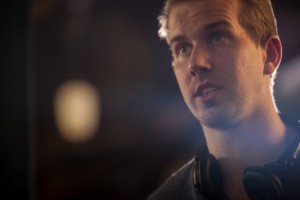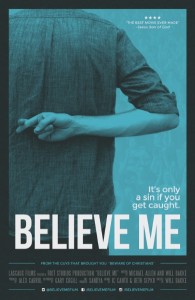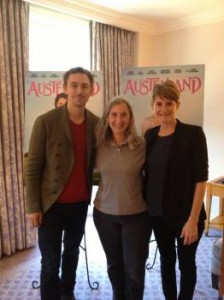Interview: Will Bakke of “Believe Me”
Posted on September 22, 2013 at 3:59 pm
 I really enjoyed talking to Will Bakke of Riot Studios about his new film, “Believe Me.” I’ll post information about the movie’s release when it is available.
I really enjoyed talking to Will Bakke of Riot Studios about his new film, “Believe Me.” I’ll post information about the movie’s release when it is available.
Tell me a little bit about this project.
I’d love to. Well, “Believe Me” is the story of four college seniors who start a fake Christian charity in order to make the money that they need for tuition for college. In the process of throwing this big fundraiser to tell people that they’re donating wells in Africa, they end up being asked to be the keynote speakers for a summer-long evangelical tour. And so they kind of get little into their heads and they decide to sign on and do it and just sort of study the Christian culture in order to get away with it. I think people would sort of expect some big altar call at the end but this is a very different story and we’re excited to tell it.
Where did the story came from?
Michael Allen and I have actually produced two documentaries together before we wrote this. We were in college when we made “One Nation Under God.” He and I and two buddies of ours road-tripped around the United States just asking people what they believed about God. We were both from Dallas, Texas. We kind of grew up in the Bible belt and realized that our faith, we only had it because our parents had it and because that’s what we were kind of raised to have. And we just wanted to get out of that bubble and just find out what other people believe and really challenge our own beliefs in the meantime. And as a result of that, it kind of brought us to make a second documentary called “Beware of Christians.” Michael and I and our other buddy Alex Carroll who jumped on board with us created that film really as just a way of solidifying what we believe and how that would shape our lives and what we would lack, especially in college. I think both of those films really were kind of the jump-off point for “Believe Me.” We made these two films that were probably labelled as Christian films, because we’re Christians ourselves but it was about us. And so we were excited to take a look at the industry and kind of see the ins and outs of it and we just realized how many funny things there are about Christians out there and so the idea of “Believe Me” came out of this: what if somebody really wanted to take advantage of that? What would Christianity look like to an outsider? That was kind of a starting point for the film.
What were some of the challenges of going from documentary to feature film?
There were a lot of challenges. When we made the documentary, we had a couple of notes written down on like a napkin on what we wanted to do while we were Europe or while we were touring around the United States. There was no real planning to it beforehand. With a movie like this, we spent about two years writing the script and polishing it and just working out every character arc, every story arc, every theme to the movie and two years of writing transitioning into directing for me. And there’s a lot of people involved. It was no longer just me holding the camera running around filming as much as I could and just throwing a story together at the end. We had a very precise story that we wanted to tell and it was a lot of people involved so it was a completely different experience. It was so rewarding and humbling and I was very excited. We actually just wrapped yesterday at 6:00 AM so I’m still winding down from the experience as you can imagine. At some point you start to feel like everyone is playing with paint brushes when you’re directing because it’s such a collaborative effort. And I loved it for so many reasons because I didn’t have to be thinking about what writing was like or exactly what the camera shots were going to be because I’d worked that out beforehand with my director of photography so on the day that we’re shooting, my mind was just fully into the story and fully into the characters and I had just this incredible team behind it that was making everything look ten times more amazing than I could have ever imagine. So it ended up being a surprise, just being able to really focus on just one aspect of filmmaking which is the directing side and much less the technical aspects because those were already worked out in pre-production.
Do you consider this one a Christian film and who do you think is the audience for it?
With this film specifically, Christianity is the backdrop to the story but I would never label it that. We didn’t want it to be that. We weren’t shooting for that. We believe this story is all about the idea of truth which is an universal theme which we’re very excited about because it doesn’t matter really where you’re coming from on the line of faith whether you’re for it, against it, whether you have it, whether you’re a part of a religious culture or not. Anyone can walk into this movie and get it and really understand the desire that we’re going after. It’s all about the idea that truth is relative and that what works for you works for you and what works for me is best for me. We start to see that there are a lot of different characters that are really good people that live with that mentally; they kind of get in their own way. And when those different wants and needs clash, it’s compelling as a viewer to see that. And so it’s not a Christian film. We’re pretty excited to tell people that just because we don’t want to have any kind of pre-conceived notions in people’s minds coming into it . One of the tough things about being labelled that is a lot of times people believe there is going to be some sort of agenda to the story which we don’t have. We just really want to tell a compelling story. There’s no secret motive or agenda behind it. Although, we are guaranteeing a 100% conversion rate with this movie; I hope that’s not confusing at all. We promise there is going to be conversion. We’re not positive on what religion it’s going to be on by the end of the show but we’re promising a 100% conversion-rate.
What effect do you think it has on people to try to live up to other people’s expectations?
It’s not so much I think for these guys to live up to expectations as much as I think it is based on themselves as a whole. They just committed to becoming the speakers on this major evangelical tour and as a result, they had to sort of adapt and they ultimately don’t want to go to jail for what they’re doing. I think a lot of it has to do with beliefs and why do you believe what you believe. It is because someone stood up on the stage and told you that something was true or is it because you have investigated and researched and really looked into what someone says and is claiming and for me alone, with this movie it’s just so interesting because Alex Russell, we was the star of the movie “Chronicle” last year. He plays the lead in our movie and in the film it was so interesting to shoot with him because there’s just some amazing scenes where he is preaching up on stage and all the credit to him because he’s an incredible actor but he just sold it so well that it made the rest of us kind of look back and be like, it’s really freaking me out how well he can sell this. And I know personally that Alex Russell doesn’t identify himself as a Christian. I think he’d be comfortable telling anybody that, he actually has. But you know, it’s very interesting to see just the words come out of someone’s mouth that seem so compassionate and so compelling and yet at the same time, isn’t what they believe.
That’s why they call it acting.
Exactly. So it really made me rethink what my youth leaders taught me back in the day. Like, ah, I wonder if they were really genuine in all of this. That’s just what gets serious about it when it has to do with religion and faith and putting your chips on something that could change your entire life, not knowing if it’s coming from a genuine place or not.
When you were writing this script and you were working on, as you said, the structures and the characters and all that, what were some of the resources that you relied on? Did you look at other movies? Did you look at books about script writing? What did you do?
We read plenty of books on screenwriting. I was a film student at Baylor University and took screenwriting courses. It was a great education in terms of like what it looks like to tell a good story and I think for the two years that we were diving into script; story was the most important thing to us. And like I said earlier, without having an agenda, that’s what we wanted to make for ourselves in the first place is compelling characters, compelling stories, even tell the stories of characters that don’t line up in the same world-view as us. We love the idea of college students just getting in over their heads and how they react. It’s just such a pivotal time of life in the way that’s going to shape you later so we love playing in that sort of age range.

